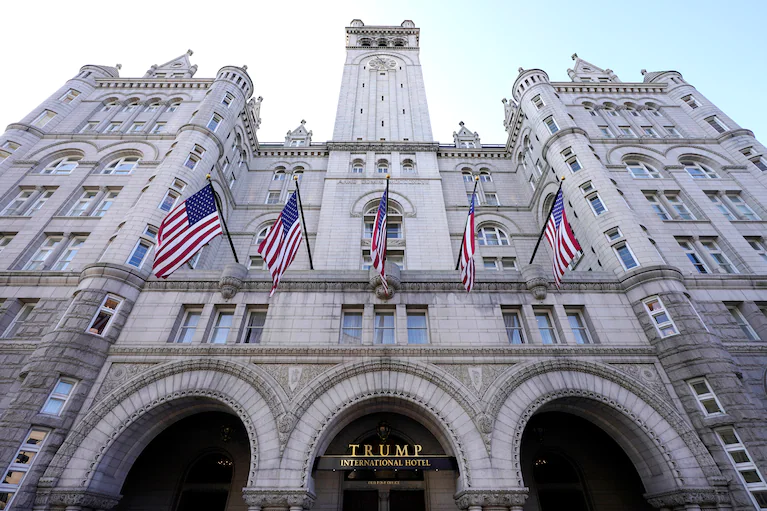Trump sells D.C. hotel lease to Miami investment group
Record-setting price will allow Trump to pay off $170 million loan to Deutsche Bank. The property will become a Waldorf Astoria hotel.
By Jonathan O'Connell
Donald Trump is leaving Pennsylvania Avenue again.
The Trump name at the former president’s D.C. hotel — on facade signs, linens, bar napkins and coasters — is set to be removed after the sale of his government lease for the property to CGI Merchant Group for a record-setting $375 million.
Miami-based CGI Merchant is partnering with Hilton to turn the Pennsylvania Avenue property into a Waldorf Astoria hotel, ending a more than five-year run in which the hotel became a power center in Trump’s Washington and a symbol of how he mixed business and politics like no other president in history.
“We took a dilapidated and underutilized government building and transformed it into one of the most iconic hotels in the world,” said the president’s son, Eric Trump, in a statement Wednesday. “We are incredibly proud of what we accomplished.”
With Trump in office, the hotel served as both a central gathering place for Republicans and a background for mass protests opposing his presidency and policies. After signing a lease with the General Services Administration for the property in 2013, he hung an enormous blue-and-white banner on Pennsylvania Avenue: “TRUMP,” it said, “Coming 2016.” Construction was finished almost as his presidential campaign wrapped up, and the hotel opened within weeks of his election win.
Government ethics experts decried his willingness to promote his candidacy alongside his business. During the week of his inaugural, his Presidential Inaugural Committee spent about $1 million on ballrooms and meeting spaces at the hotel. That prompted a lawsuit from D.C. Attorney General Karl A. Racine, which was finally settled May 3 of this year, clearing the way for the deal to close.
Calls for the lease to be revoked or for Trump to divest himself of his real estate assets grew louder after he entered office and foreign leaders, corporations and Republican politicians booked rooms and parties at the hotel as part of their efforts to curry favor with Trump.
Trump held on to the lease despite a series of lawsuits and constitutional challenges led by Democratic leaders. The GSA — through the final months of President Barack Obama’s second term, the entirety of Trump’s own term and more than a year of President Biden’s — never took action against Trump despite a clause in the lease barring any “elected official of the government of the United States” from deriving “any benefit” from the arrangement.
Many embassies and associations refused to book events at the hotel, causing the property to pile up millions of dollars in losses over four years, according to financial documents Trump’s company provided to the government and released by the House Oversight Committee in October 2021.
But Trump’s supporters — whether tourists in MAGA caps or senators raising campaign money — flocked to the hotel and its expansive lobby bar. At the steakhouse in back, Trump’s private lawyer set out a nameplate, “Rudy Giuliani, Private Office.” In a room upstairs, Giuliani and his team plotted the outreach to Ukraine that would lead to Trump’s first impeachment.
Holding on to the contract will now afford Trump an enormous payday. Trump won the lease deal from the GSA after committing to spend $200 million developing the property. Critics scoffed at the price, which was far higher than other companies were willing to pay.
Now his $200 million bet on the property — like many of his bold political gambles — will pay off, probably delivering him a profit of more than $100 million, hotel experts said, even after accounting for the $170 million loan to Deutsche Bank he must pay off, the operating losses he incurred and a complex revenue-sharing agreement with the government.
The profits come as the result of a willingness by CGI Merchant, whose investors include celebrity athletes Alex Rodriguez and Floyd Mayweather, to pay a number higher than some hotel analysts say is likely to reap a profitable return.
“We are thrilled to partner with our friends at Hilton to bring the Waldorf Astoria brand to an iconic landmark in the nation’s capital and look forward to working closely together to have a lasting and positive impact on the Washington, D.C. community,” said Raoul Thomas, CEO and founder of CGI, in a Wednesday statement.
“Hilton is committed to serving any guest, for any travel need they have, anywhere in the world, and we’re thrilled to partner with CGI to expand our presence in the nation’s capital,” said Chris Nassetta, president and CEO of Hilton, in a statement.
By every measure, the $375 million price is a record for Washington. Hotels are priced on a per-room, or “per-key,” basis. In Washington, the high-water mark came in 2016, when the Capella Hotel Georgetown — now the Rosewood hotel — sold for about $1.3 million per key, according to industry data. At $375 million for 263 guest rooms, the proposed Trump sale would come to about $1.43 million per key, 10 percent higher than the Capella sale, despite the requirement that CGI pay the government a base rent of more than $3 million annually.
“Today’s sale is the latest in a long line of questionable deals, conflicts of interest, and constitutional violations involving former President Trump and his Washington, D.C. hotel,” said House Oversight Chair Carolyn B. Maloney (D-N.Y.) in a statement.

No comments:
Post a Comment